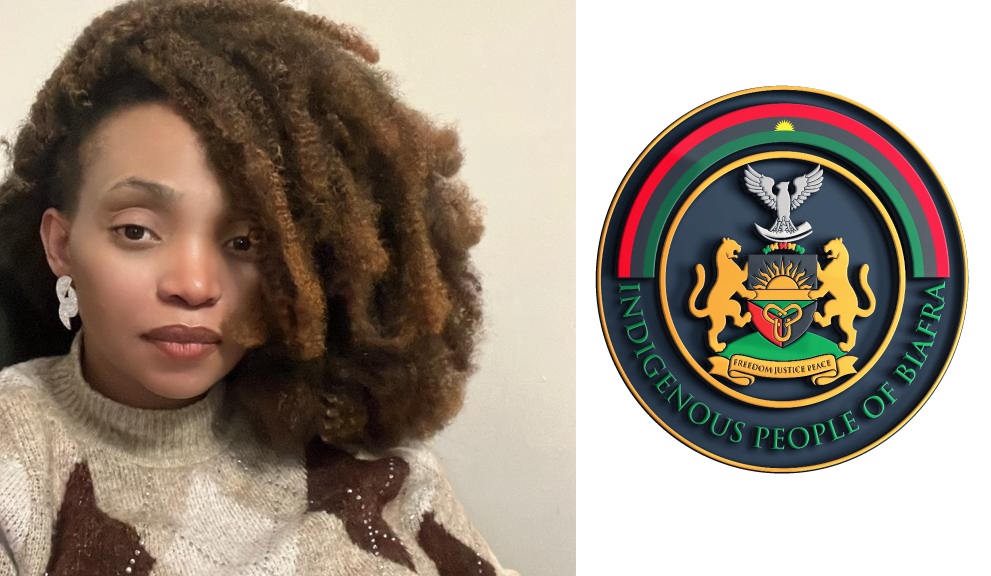
Controversy Trails Justice Omotosho’s Verdict on Nnamdi Kanu as Mrs. Okwu-Kanu Raises Alarm
Supporters question eight-day medical panel order, allege DSS coerced doctors under gunpoint and downplayed Kanu’s health concerns
Abuja, Nigeria – September 27, 2025
A new round of controversy has emerged following Justice Omotosho’s recent ruling on the case of Mazi Nnamdi Kanu, the leader of the Indigenous People of Biafra (IPOB).
Lolo Uchechigeme Anyanwụụtụtụ Okwu-Kanu, responding to the verdict, has raised serious concerns about the credibility of the directives issued, the handling of Kanu’s medical needs, and the wider political implications for Nigeria.
Justice Omotosho outlined three key directives regarding Kanu’s medical care, but Mrs. Okwu-Kanu described them as fallible and open to manipulation:
Formation of Medical Panel by NMA
The Nigerian Medical Association (NMA) was ordered to set up a panel of 8–10 members to evaluate Kanu’s health condition.
Mrs. Okwu-Kanu argued the directive is flawed because it excludes Kanu’s private medical team, notably Prof. Aghaji who carried out initial tests. She insisted that without an independent or trusted physician on the panel, the integrity of the process is in question.
Assessment of DSS Facilities
The panel was tasked with evaluating whether the Department of State Services (DSS) can adequately treat Kanu’s condition.
Okwu-Kanu rejected this approach, pointing out that Nigeria’s political and economic elites routinely seek care abroad, in India, Turkey, or Western nations, and questioned why Kanu should be confined to facilities that even the country’s leaders avoid. She noted that no European royal family or senior politician would typically travel to Nigeria for treatment.
Eight-Day Report Submission:
Justice Omotosho directed that the panel’s president and secretary must sign and submit the report to the court within eight days.
Okwu-Kanu sharply questioned the need for an eight-day deadline, asking where a medical examination lasts more than 48 hours. She argued that the extended timeframe is puzzling given that medical evaluations are normally completed quickly and warned that the extra days would create an opportunity for manipulation. Her statement referenced earlier allegations that medical reports related to Kanu had been tampered with by the prosecutor Mr. Awomolo SAN.
Lolo Uchechigeme Anyanwụụtụtụ Okwu-Kanu raised two urgent allegations, stating:
“Can Awomolo and the DSS explain why the DSS can subject a doctor to alter the medical report of Mazi #NnamdiKanu under gun point????
Why is Awomolo and the DSS assiduously trying to negate the importance of Mazi #NnamdiKanu’s health issues????”
These allegations are serious and have been publicly repeated by Kanu’s lawyers and his wife; they must be treated as accusations that demand serious and independent verification.
Political and International Dimensions
Beyond the medical debate, Okwu-Kanu linked the ruling to Nigeria’s political climate and its international image.
Global Scrutiny:
She recalled Kanu’s abduction in Kenya where the Nigerian government tortured him for eight day before forcefully renditioning him to Nigeria, which already drew significant international attention. She warned that continued neglect of his health could intensify debates over human rights violations and increase diplomatic pressure on Nigeria.
Symbolism for Biafra Movement:
Mrs. Okwu-Kanu emphasized that Kanu remains a powerful symbol for Biafra’s self-determination struggle. Any perceived mistreatment, she said, risks sparking unrest in the South-East and deepening grievances among a population that has long felt marginalized reechoing the Press statement from IPOB about the regional implications of Nigeria government downplaying the health of Mazi Nnamdi Kanu.
Judicial Oversight of Executive Power:
Mrs. Okwu Kanu stressed the judiciary’s role as a check on executive authority, she criticized the courts’ handling of the DSS, accusing them of failing to uphold accountability where human rights are at stake. She also condemned Justice Omotosho’s earlier refusal to acknowledge evidence of extraordinary rendition, despite findings and concerns raised by the UN Working Group on Arbitrary Detention and other international observers, thus calling into question the position of Justice Omotosho in the case and what she hopes to achieve by avoiding such a credible information.
Public Trust in the Judiciary at Stake
The statement further highlighted concerns about the judiciary’s credibility. According to Mrs. Okwu-Kanu, how the courts handle Kanu’s case will either reinforce judicial independence or expose systemic bias. She warned that the politicization of the judiciary, previously flagged by figures such as former Vice-President Yemi Osinbajo poses a grave risk to Nigeria’s legal integrity. The handling of medical evidence and the transparency of the panel’s process are, in her view, central to whether public confidence in the justice system can be salvaged.
Lolo Uchechigeme Anyanwụụtụtụ Okwu-Kanu’s reaction highlights general deep skepticism regarding the fairness of Justice Omotosho’s directives on Mazi Nnamdi Kanu’s medical care. By questioning the exclusion of Kanu’s own medical team, rejecting the sufficiency of DSS facilities, and explicitly querying why an eight-day window is needed when medical assessments rarely extend beyond 48 hours, Mrs. Okwu-Kanu like millions of Biafrans sees the ruling as potentially permissive of manipulation.
Nigeria don’t have adequate facility to handle the health of mazi Nnamdi Kanu